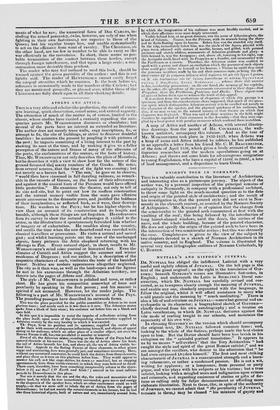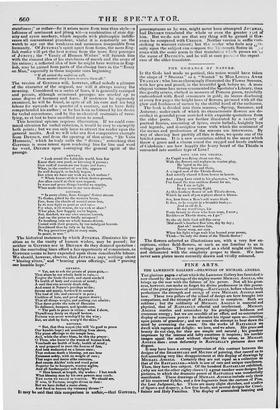NUTTALL'S AND GIFFORD ' S JUVENAL.
DR. Nurreee has obliged the indifferent Latinist with a very useful and sightly edition of Juvertse. On the left page is the text of the great original ; on the right is the translation of GIF- FORD; beneath GIFFORD'S verses are illustrative foot-notes, in English ; and underneath the Latin is STIRLING'S literal con- struction, which Dr. Memel. has carefully revised and cor- rected, so as toexpress clearly enough the meaning of JUVENAL, and enable any one, slenderly acquainted with the language, to follow the original, whilst it will afford assistance to many who could puzzle out the meaning by " much meditating." There is also a life of and criticism on JUVENAL—somewhat general and en- cyclopsedic in its character; a biographical sketch of GIFFORD- chiefly derived from his own autobiography ; and a treatise on Latin versification, in which Dr. Nurrses declaims against the vile mode of reading taught in our schools, and maintains the superiority of his own way. In choosing GIFFORD'S as the version which should accompany the original text, Dr. Nurreee followed common fume; and, looking to the whole of the Satires, perhaps made the best choice open to him. But the Doctor should have been less lavish in hie eulogium on the " splendid poetical translation." It appears to us by no means " self-evident" that the Tory Aristarchus " had caught the style and spirit of the great Roman satirist ;" and we are amongst the cavillers, who demur to the admission that" he had even surpassed Dryden himself." The first and most striking characteristic of JUVENAL is a concentrated strength and a burn- ing vehemence, or rather a condensed passion. He is not a wit, writing for applause; or a lampooner, from personal or party pique, and who plays with his subjects or his victims; but a true satirist, looking with a mingled scorn and indignation upon crimes and criminals, and regarding eminence of station or gifts of for- tune as calling only for fuller denouncement or affording more elaborate illustration. Next to these, (for, in spite of the authority of JOHNSON, we cannot admit that " the peculiarity of JUVENAL" consists in them,) may be classed " his mixture of.gayety and stateliness ;" or rather—for it arises more from tone than style—a loftiness of sentiment and jibing wit—a combination of stoic dig- nity and cynic mockery, which regards wilh philosophic indiffe- rence all conventional grandeur, whilst it is constantly on the watch to spy out the weakness and meanness inseparable from humanity. Of JUVENAL'S spirit apart from forms, the mere Eng- lish reader will get the best notion from the more fiery passages of Jumus ; the " Vanity of Human Wishes" will furnish him with the clearest idea of his stateliness of march and the scope of his satires; a reflected idea of how he might have written in Eng- lish, may be gained from parts of the closing lines in the "Essay -on Man," especially in those majestic ones beginning
" If all united thy ambition call, From aueient story learn to scorn them all."
The version of GIFFORD will, however, afford nobody a glimpse of the character of the original, nor will it always convey the meaning. Considered as a series of lines, it is generally cramped and prosaic, although occasional passages are worked up to some degree of harmony and force. If sentences be rigorously examined, he will be found, in spite of all his care and his long labour for upwards of a quarter of a century, not to have fully comprehended his author ; or he has been so fettered by his desire for vethal correctness, and by the mechanical restraints of versi- fying, as at last to have sacrificed sense to sound. This heretical opinion requires illustration. If we could com- mand attention for verbal criticism, it would be easy to exemplify both points ; but we can only hope to attract the reader upon the (general merits. And we will take our first comparative example from DRYDEN, and from the opening of that satire, "Do Votis Humanis," which he truly calls the " divine; " remarking that
• Gistroan is more intent upon rendering line for line and word for word, Diansx upon conveying the general spirit of the passage.
DRYDEN.
" Look round the habitable world, how few Know their own good, or knowing it pursue; How void of reason are our hopes and fears; What, in the conduct of our life, appears So well design'd, so luckily begun, But when we have our wish we wish undone !
" Whole houses of their whole desires posseat, Are often railed at their own request. In wars and peace things hurtful we require, When made obnoxious to our own desire."
cirroan.
"In every clime, from Ganges' distant stream To Godes, gilded by the western beam, Few, front the clouds of mental error free,
In its true light or good or evil see—
For what, with reason, do we seek or shun ?
What plan, how happily soe'er begun,
But, finished, we our own success lament, And rue the pains so fatally misspent? To headlong ruin see whole houses driven, Cursed with their prayers, by too indulgent heaven.
Bewildered thus by folly or by fate,
We beg pernicious gifts in every state, In peace, in war."
The historical instances by which JUVENAL illustrates his po- sition as to the vanity of human wishes, may be passed; for neither in GIFFORD nor in DRYDEN do they demand quotation : but the concluding lines afford a fair opportunity of comparison, as GIFFORD seems to have expended upon them considerable labour. We should, however, observe, that JUVENAL says nothing about " blazing altars," and "bearing pious offerings," and " proving our humble hope.'
DRYDEN.
" Yet, not to rob the priests of pious gain,— That altars be not wholly built in vain,— Forgive the Gods the rest, and stand confin'd To health of body and content of mind ; A soul that can securely death defy, And count it Nature's privilege to die ; Serene and manly, harden'd to sustain The load of life, and exereis'd in pain ; Guiltless of hate, and proof against desire; That all things weighs, and nothing can admire;
That dares prefer the toils of Hercules To dalliance, banquet, and ignoble ease.
a The path to peace is virtue : what I show,
Thyself may freely on thyself bestow. Fortune was never worship'd by the wise ; But, set aloft by fools, usurp'd the skies."
GIFFORD.
" But, that thou maytit (for still 'tis good to prove Our humble hope) ask something from above, Thy pious offerings to the temple bear, And, while the altars blaze, be this thy prayer :
0 Thou, who know'st the wants of human kind,
Vouchsafe me health of body, health of mind ; A soul prepared to meet the fiowns of fate, And look undaunted on a future state;
That reckons death a blessing, yet can bear
Existence nobly, with its weight of care ; That anger and desire alike restrains, And counts Alcides' toils and cruel pains Superior far to banquet', wanton nights,
And all Sardanapalus' soft delights!-
" Here bound, at length, thy wishes : I but teach What blessing man by his own powers may reach.
THE PATH TO PEACE IS VIRTUE. We should see,
If wise, 0 Fol tune, nought divine in thee: But we have deified a name alone, And fixed in heaven thy visionary throne !"
It may be said that this comparison is unfair,—that GIFFORD, presumptuous as he was, might never have attempted JUVENAL, had DRYDEN translated the whole or even the greater art of him. But we do not see that any thing will be gained it Gir- FORD be compared with CREECH. Neither version is suffic curl.. striking to warrant extract ; but the reader who feels any cos- osity upon the subject can compare the '1 hirteenth Satire in L r FORD with the same poem in that translation which passes un-se the name of DRYDEN'S, and he will at once perry:: to the superi ease of the elder translator.
THE ROMANCE OF NATURE.
IF the Gods had made us poetical, this notice would have taken the shape of " Stanzas" or a " Sonnet " to Miss LOUISA ANNE TWAMLEY ; who has so charmingly illustrated the Flower Seasons; with her pen and pencil, in the beautiful kook before us. A more elegant volume has never ornamented the Spectator's Library, than this goodly octavo, clothed in morocco of Pomona green, tastefully embroidered with floral ornaments in gold; its leaves disclosing at every few pages the bright hues of flowers, pictured with all the glow and freshness of nature by the skilful band of the authoress. The book is divided into three seasons,—Spring, Summer, and Autumn ; under each of which its characteristic flowers are de- scribed in graceful prose enriched with exquisite quotations from the elder poets. They are further illustrated by a variety of poetical fancies, consisting of lyrics, rustic ballads, knightly lays and legends, and descriptive verse with which the sentiment of the scenes and productions of the seasons are interwoven. By way of showing how prettily all this is done, we quote one of the briefest poems. It is a new association added to the many which throw a grace and a charm round the rugged and hardy emblem of Caledonia :" see how happily the hoary beard of the Thistle is converted into another type of Lbve LOVE AND TILE THISTLE.
As Cupid was flying about one day, With the flowers and zephyrs in wanton play, He 'spied in the air, Floating here and there, A winged seed of the Thistle-flower, And mei rily chased it from bower to bower.
And young Love cried to his playmates, "See, I've found the true emblem-flower for me, For I am as light
In my wavering flight As this feathery flower of soft Thistle-down, Which by each of yon zephyrs about is blown. See, how from a Rose's soft warrn blush It flies, to he caught in a bramble bush ;— A od as oft do I, In my waturrings, hie
From beauty to those who have none, I trow ; Reckless as Thistle-down, on I go."
So the sly little God still flits away 'Mid earth's loveliest flow'rets, day by day; And oh ! maidens fair, Never weep, nor care
When his light wings waft him beyond your power,
Think—'tis only the down of the Thistle-flower !
The flowers selected as illustrations are, with a very few ex- ceptions, either field-flowers, or such as are familiar to us in cottage gardens. They are grouped as a child might cull them, and delineated with the simplicity proper to them. We have never seen plates more correctly drawn and vividly coloured.



























 Previous page
Previous page